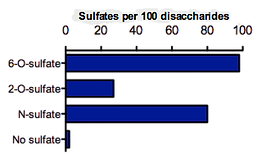
Recombinant Heparan Sulfate Research Reagents
Heparan sulfate activity varies based on sulfate content and chain length. TEGA offers recombinant heparan sulfate (rHS) with a variety of compositions for investigation of diverse biological systems.
Advantages of TEGA rHS
-
Non-animal derived
-
High batch-to-batch consistency
-
Laboratory confirmed sulfate content, chain length and purity
Recombinant heparan sulfate can be purchased as single milligrams or as a value pack including five different varieties.
Our products are currently available by request only. While our online checkout is temporarily paused, we remain dedicated to fulfilling your needs. If you are interested in placing an order or learning more about our current availability, please contact our team at: info@tegatherapeutics.com. (1/8/2026)


Ordering
Sampler Set
Cellular Heparan Sulfate Sampler Set
100 µg of each of the 12 variants
$850
12 x 100 µg
rHS08
Cellular Heparan Sulfate
~14 kDa (60 monosaccharides)
*Contain 3-O-sulftated moieties

1 mg
$500
rHS30
Cellular Heparin
~25 kDa (77 monosaccharides)
*Contain 3-O-sulftated moieties

1 mg
$500
Ordering & Shipping
-
If rHS variants are not in stock, it may take up to 2 months to produce (please inquire regarding availability before ordering).
-
Discounts are available for larger orders. Please contact us at info@tegatherapeutics.com for more information.
-
rHS products are shipped as lyophilized powders and are shipped at room temperature.
-
rHS products are available for pickup, local delivery <3 miles ($40), or can be shipped domestically ($80) or internationally ($200).
TEGA Recombinant Heparan Sulfate in Publications
-
Bruch's membrane heparan sulfate retains lipoproteins in the early stages of age-related macular degeneration. Proc Natl Acad Sci U S A. 2025. Link to PubMed.
-
Heparan Sulfate-Collagen Surface Multilayers Support Serum-Free Microcarrier Culture of Mesenchymal Stem Cells. ACS Biomater Sci Eng. 2024. Link to PubMed.
-
Validation of Recombinant Heparan Sulphate Reagents for CNS Repair. Biology 2023. Link to article.
-
Biologically Derived Neoproteoglycans for Profiling Protein–Glycosaminoglycan Interactions. ACS Chem Biol. 2022. Link to PubMed.
-
Multiplex genome editing of mammalian cells for producing recombinant heparin. Metabolic Engineering. 2022. Link to PubMed.
-
SARS-CoV-2 Infection Depends on Cellular Heparan Sulfate and ACE2. Cell. 2020. Link to PubMed.
-
ZNF263 is a transcriptional regulator of heparin and heparan sulfate biosynthesis. Proc Natl Acad Sci U S A. 2020. Link to PubMed.
-
Proteomics-based screening of the endothelial heparan sulfate interactome reveals that C-type lectin 14a (CLEC14A) is a heparin-binding protein. J Biol Chem. 2020. Link to PubMed.









.png)
